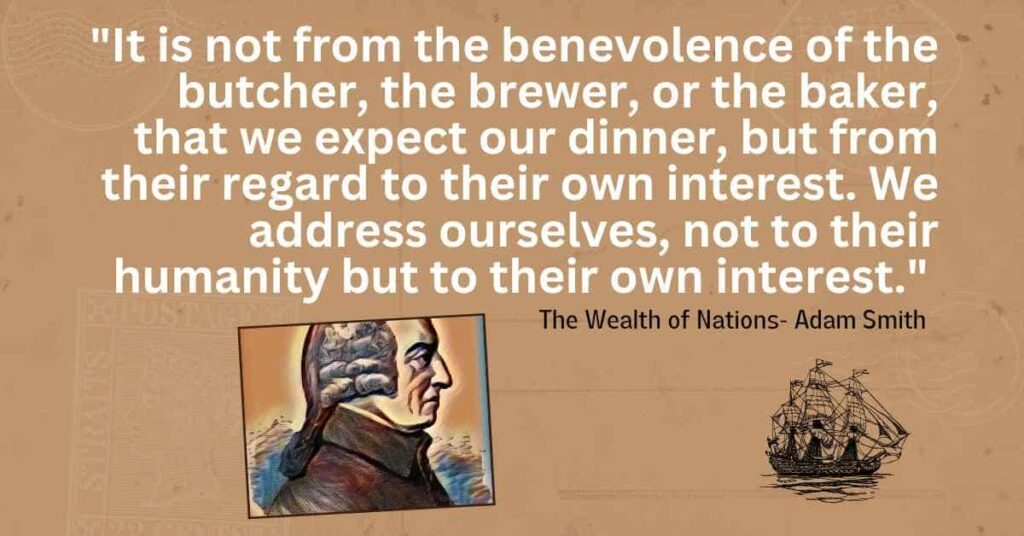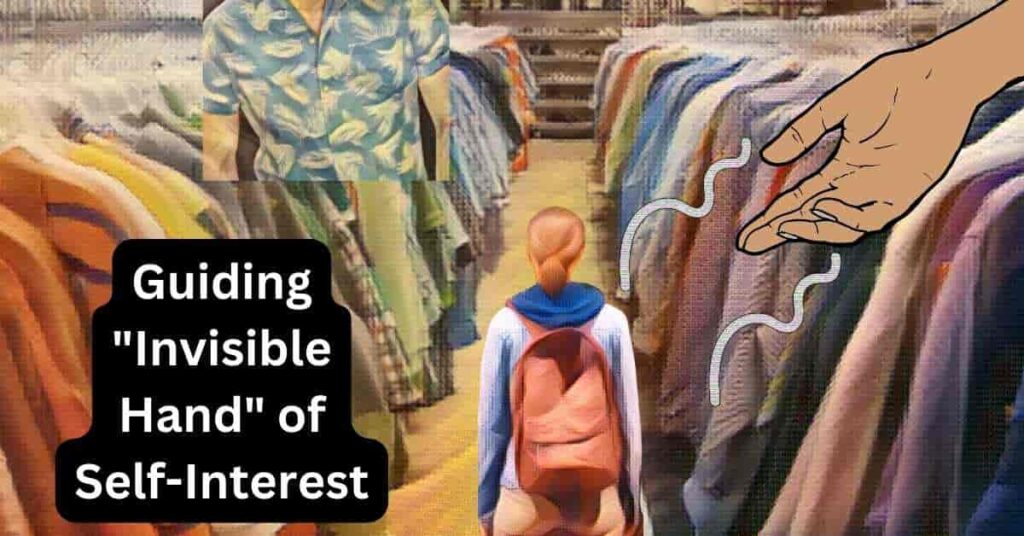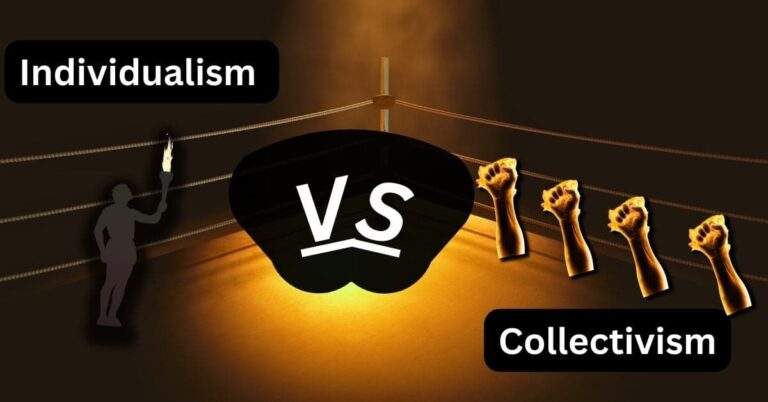“What’s in it for me?” These words are what you associate with self-interest. Whether you’re negotiating a business deal or discussing plans with a friend, self-interest benefits society and you.
Adam Smith popularized the term “self-interest”. He believed in enlightened and rational self-interest using a term he called the “invisible hand”. This “hand’ acted as a guiding light to society’s benefit. Also, economic competition became a key component of his self-interest theory.
To write this post, I acted in my own self-interest to deliver the best possible brochure for you. I reread all my notes on the Adam Smith works I’ve consumed.
Act in your best self-interest by reading my information below.
Self-Interest Defined and Its Roots
In this section, I will give you an overview of what Smith’s self-interest is. I will provide clarity between self-interest and selfishness since people confuse the two.
Self-Interest Roots
Self-interest is part of economic individualism and the political economy.
Smith developed the idea in his magnum opus An Inquiry Into the Nature and Causes of the Wealth of Nations. The shortened title is Wealth of Nations for simplicity.
His 1776 masterpiece is a whole book of self-interest. If you know your American history, what other event happened in this fateful year?
Of course, you know the answer- the American Revolution and the fight for independence. American Founders used it as a guidebook. They developed the U.S. economy based on self-interest values.
Why not test Smith’s ideas within the American Liberty Experiment?
He justified the use of self-interest with his work The Theory of Moral Sentiments (1759). Yes, he wrote this book before the Wealth of Nations.
Most of you haven’t heard of this work. It deals with morality, philosophy, and the self-interest psychology of economics.
Moreover, his magnum opus denounced the crony capitalism of the 18th century called mercantilism. Mercantilism denied self-interest to European peasants.
Simply put, self-interest is the foundation of a market economy. Some people relate self-interest to a term called “self-love”.
As I have described in other posts, human nature is part of self-interest.
When making decisions, you base them on the potential pleasure they will provide. You want to avoid pain at all costs.
Indulging in a chocolate chip cookie is a pleasurable experience. Exercising when you don’t want to is painful.
If any of you like business or self-improvement books, Tony Robbins is a household name. In his book Awaken the Giant Within: How to Take Immediate Control of Your Mental, Emotional, Physical, and Financial Destiny, he discusses pain and pleasure.
Robbins’ main focus is to spark your inner self and motivate your highest potential. The book title is self-explanatory.
You need your self-interest to create and start any new venture.
Self-interest is a natural part of society and economics. I want to remind you that you have it reading this post. You want to learn and understand the secrets of Adam Smith.

What is Self-Interest vs Selfishness?
Self-interest and selfishness aren’t the same concepts. I know they both start with a “s”. But that’s it.
Self-interest is exchanging a favor for a favor. A person will gain value by trading time, money, or labor with another party.
Self-Interest Definition
Smith started the self-interest movement for the mutual benefit of society and you. If you look up the definition in a dictionary, they vilify self-interest. It is a simple concept that’s natural.
Here are a few more examples of self-interest benefitting you as mentioned in the above quote:
- Butchers- like the ones in Middle America- supply the best Thanksgiving and Christmas meats
- Bakers– the place that smells delicious- bake bread for your breakfast needs
- Brewers– like your corner shop – want to make the best “adult beverages” for you during the Fourth of July
Businesses- like the butcher, baker, and brewer- don’t hoard resources like in the mercantilist past. But they provide the best service ethically, according to their self-interest.
Now, we will transition to describing selfishness.
Selfishness is when you have no regard for anyone but yourself. You take and give nothing of value in return.
Selfishness Definition
To show the disparity, society has a way of correcting itself. Companies act in their self-interest by providing you with an ethical product. In return, they enhance their public image and don’t receive backlash.
However, when they’re selfish, the public gives them the cold shoulder of disapproval. Cultural norms help restrain selfishness.
Today, people and companies combat selfishness with empathy. Smith called it “sympathy”.
Companies sponsor marathons or charity events. Don’t fool yourself.
It is in a company’s self-interest to promote their generosity. The publicity is free advertising and good for business.
Furthermore, critics of self-interest mention Ayn Rand and her work The Virtue of Selfishness. They see her as a horrible, selfish human being. Because she condemned altruism.
She exposed the downfalls of altruism and how it appeared beneficial in select circumstances.
Self-interest and selfishness differ like hogs and princesses. Hogs are smelly and wallow in the mud. Princesses resonate with beauty and project power.
In the end, self-interest provides mutual benefit, unlike selfishness.
People associate Ayn Rand and her reputation with pure selfishness because she spoke against altruism. LEARN MORE on why she went against cultural norms with my article Ayn Rand Against Altruism.
Difference Between Self-Interest and Enlightened Self-Interest?
Refer to the definition above for what self-interest is.
Enlightened self-interest is the primary focus of this sub-section.
Enlightened self-interest is an ethical service to others. Individuals still involve their own self-interest, but others receive help along the way.
Enlightened Self-Interest Definition
If Smith lived today, he would want your self-interest to be rational and enlightened. Market values dictate companies treat their customers with the utmost respect. Without it, companies fail.
Corporations that take a personal interest in their customers’ interests surpass their competition. Enlightened businesses want the best for their employees.
The happiest and best places to work display signs of enlightened self-interest.
Here is a Business Insider article ranking the happiest places to work. Decide for yourself based on your personal experience with the companies listed.
Moreover, this service-based self-interest complements religious values. Many of those happy companies are not secular places to work. I know this is a deep subject. I want you to think about this.
To close out this section, here is a famous quote from a former president that displays enlightened self-interest.
Self-Interest Related Articles:
• Enlightened self-interest involves keeping your ethics. What is the difference between ethics and morality? LEARN MORE about these terms in ethics of economic individualism.
• We all want to pursue our self-interest. JFK wanted you to pursue your dreams. LEARN MORE about dreaming and pursuing your self-interest.
Smith’s “The Invisible Hand” and How it Benefits Society
The “Invisible Hand” as Adam Smith presented it.
Basic Understanding of Society
Smith mentioned the “invisible hand” once in the Wealth of Nations and Theory of Moral Sentiments.
And this one phrase garnered Smith worldwide fame as the:
- Father of Capitalism
- Father of Free-Market Economics
Smith used this “invisible hand” example to describe how markets operate. He made it okay to pursue one’s self-interest.
People participate in voluntary actions benefiting themselves and society. The factory earns a profit from its product. In return, a customer benefits from the newly acquired goods.
Let’s give some real-life examples.
Do you want that new pair of shoes? Do you yearn for a new shirt?
You have self-interest to keep yourself looking spiffy. Because you have events and people to see.
Don’t worry. A company will satisfy your cravings.
In short, both the company and you are pursuing self-interest.

When you’re walking down the shirt aisle, you’re guided by the “invisible hand”. It is pushing you to buy the Hawaiian vacation shirt for the cheapest price.
Another way to describe this phenomenon is your unconscious desire to want the best. Your own “invisible gut feeling” guides your self-interest to this shirt.
Also, the shirt manufacturer wants some dollars in exchange for this Hawaiian shirt. They need an incentive to produce a quality product for you. Profit and their own self-interest in balancing their budgets motivate them.
Bad products and companies don’t survive in free-market capitalism.
Looking at both of the transactions above, we see the “invisible hand” in action. It benefits both parties.
In summary, you want the best shirt. The “invisible shirt manufacturer hand” encourages the company to provide the best product. Everyone benefits from this interaction- the company, society, and you.
The voluntary exchange of goods keeps the engines of innovation alive.
Chicago Economists and Promotion of the “Invisible Hand”
Have you ever wondered how ideas spread?
Charisma and a face promote the notoriety of concepts waiting in the crevices to blossom.
Thank the Chicago School Economists for giving Adam Smith a modern place in your daily life. Milton Friedman is the top contributor to this self-interest movement.
Friedman’s philosophy – like Smith’s- wants maximum liberty. They want you to decide what your best economic self-interest is. And the best tool is the “invisible hand” of the free market.
What are the primary obstacles to capitalism and self-interest? I’m glad you said government intervention.
Friedman took his anti-government crusade to the airwaves. He entertained thousands of learners on the Free to Choose Network. This series is like the modern Ben Shapiro college debates.
I will now indulge your curiosity with a clip from Milton Friedman himself on self-interest.
Remember, pursuing your ethical self-interest provides you with liberty.
Smith and Competition and Ethics
Competition is an important part of companies maximizing their self-interest. Without it, they’d have no incentive to produce that Hawaiian shirt mentioned above.
What is Economic Competition?
In short, competition is responding and adapting to a threat.
Stephen Stigler- a close friend to Milton Friedman- describes competition as the following.
“process of responding to a new force and a method of reaching a new equilibrium.”
Stephen Stigler
Competition helps a company organize its priorities.
When a company responds to competition, it will maximize its self-interest efficiently. They will organize their resources where they’re needed.
Companies don’t want to waste:
- time
- money
- self-interest
Mismanagement leads to losing profit and risk failure.
Free markets with fair competition and minimal government keep the “invisible hand” alive. Lower prices result, which is fantastic for the consumer.
“A competition will immediately begin among them, and the market price will rise or less above the natural price…”
The Wealth of Nations – Adam Smith
Adam Smith describes how prices work to your advantage.
Ultimately, subpar companies need to fail to keep the economic ecosystem healthy. Competition keeps everyone in check.

Mercantilism- The System Smith Opposed
The primary objective of Wealth of Nations wanted to rid of mercantilism.
A simple way to describe mercantilism is 18th-century crony capitalism. European kings and queens entered their boardrooms to institute anti-free market policies. These strategies included protectionist initiatives against foreign competition.
They wanted to hoard as much gold as possible in their treasure chest. And this never-ending appetite for gold started war after war.
Smith saw the horrors of this. How could this benefit the social and public self-interest? It didn’t.
These European governments used economic weapons as :
- high import duties
- import restrictions
- subsidies of domestic producers
All these intervention tactics destroy competition. Companies don’t innovate to satisfy your silky Hawaiian shirt self-interest with mercantilism as the norm.
This is government central planning in action.
Essentially, their command economies represented the interests of only a few. If Friedman lived during this time, he’d have something to say.
Company Social Responsibility and Friedman
Smith and Friedman recognized the uncontrollable aspects of human nature. He knew competition and public interests conflicted at times.
Only in a minor capacity should government intervene. Smith and Friedman believed government acts as the referee in the public interest.
These are the 2 main reasons for government regulation and intervention:
1. Fraud
When you go to the store, you want the product to represent what the label says. Biting into a 100% chocolate bar with spinach in it sounds gross. Matching expectations is important.
2. Regulating Fair Competition
Companies that fix prices by colluding with other competitors are not in a free market. It is an unfair and unethical business practice.
The government should step in to protect public interest against this racket.
Here’s what Friedman states companies should do to maintain social responsibility and their best self-interest:
- Follow business ethic customs
- Don’t take part in fraud
- Obey the law
- Participate in the free competition market
Having trouble understanding human nature? LEARN MORE and discover it by reading the survival instincts of human nature. I do talk about greed.
Conclusion
Self-interest and Adam Smith go together like jelly on a peanut butter sandwich. You need them both to have a functioning economy and society.
Enlightened self-interest core idea is service to your primary audience or consumers. It is one step up above the basic definition of self-interest I describe at the beginning of this post.
Smith invented the notion of the “invisible hand”. It escorts you down the store aisles giving a needed push to the mutual benefit of all involved.
Moreover, competition enhances self-interest by prioritizing what companies focus on. The world is full of distractions.
Many modern forward thinkers- like Milton Friedman -garnered your attention in the self-interest movement. Without them, who knows where the economic individualism freedom movement would be.
I want liberty for you. And recognizing self-interest as normal continues to keep liberty alive.
Adam Smith and self-interest are key ingredients to individualism. Its adversary is collectivism. LEARN MORE as I dive deep into the economics, politics, and family dynamics of each.
What is your self-interest in reading this? Are you a free market advocate or a student researching an assigned topic? Tell me what you think. It is in your and my self-interest if you reach out to me.
J. Liberty
References:
Glory, M. L. (2022). Adam Smith’s America: How a Scottish Philosopher Became an Icon of American Capitalism . Princeton : Princeton University Press.
James, H. S., & Rassekh, F. (2000). Smith, Friedman, and Self-interest in Ethical Society. Business Ethics Quarterly, 10(3), 659-674.
Lewis, Edited by: Hunter. (2011). The Essence of Adam Smith’s Wealth of Nations. Edinburg: Axios Press.
Roberts, R. (2014). How Adam Smith Can Change Your Life. New York: Penguin Group.
Photo Credits
Photo Credits:
© HodagMedia via canva.com
© amazingmikael via canva.com
© undrey via canva.com
© DianaDuda via canva.com
© Wilshirelimages via canva.com



